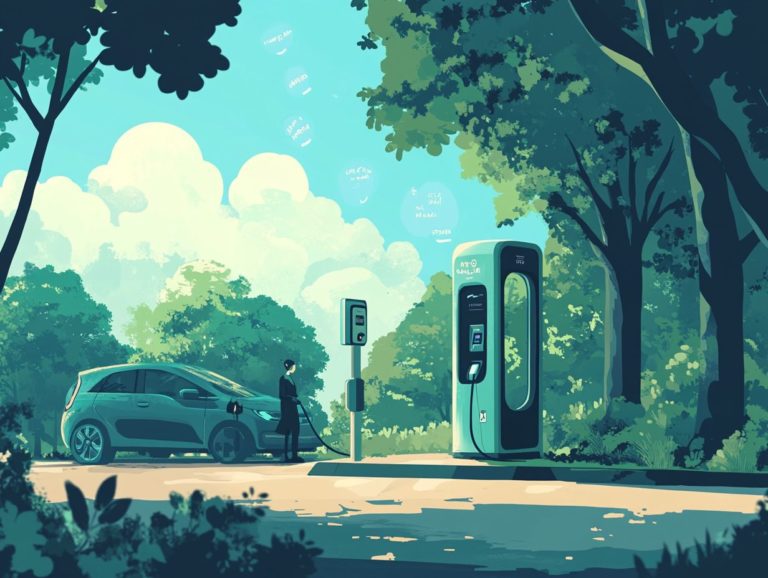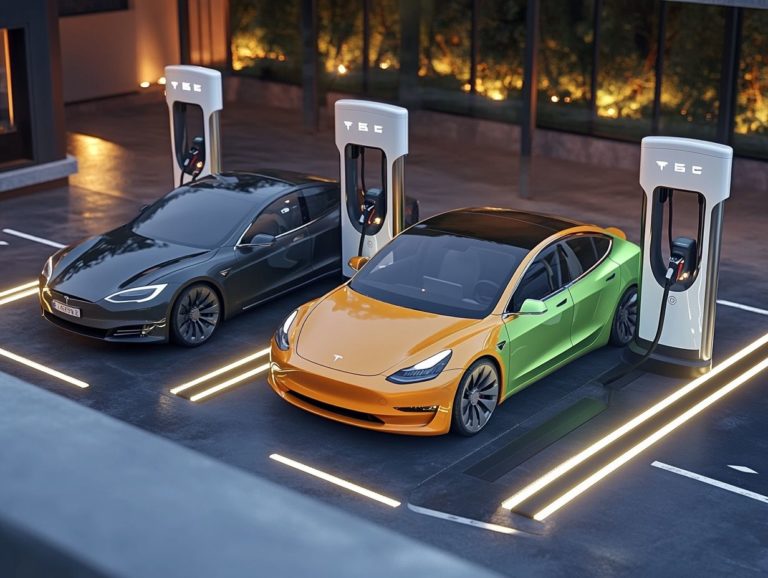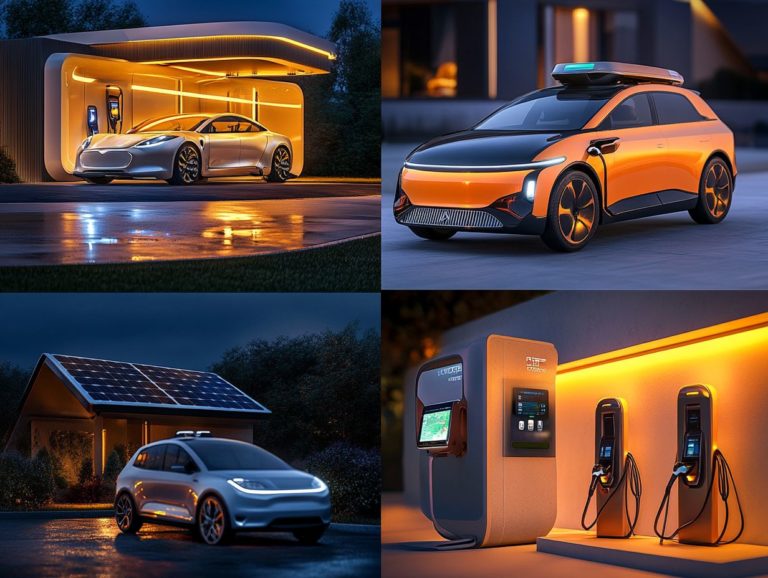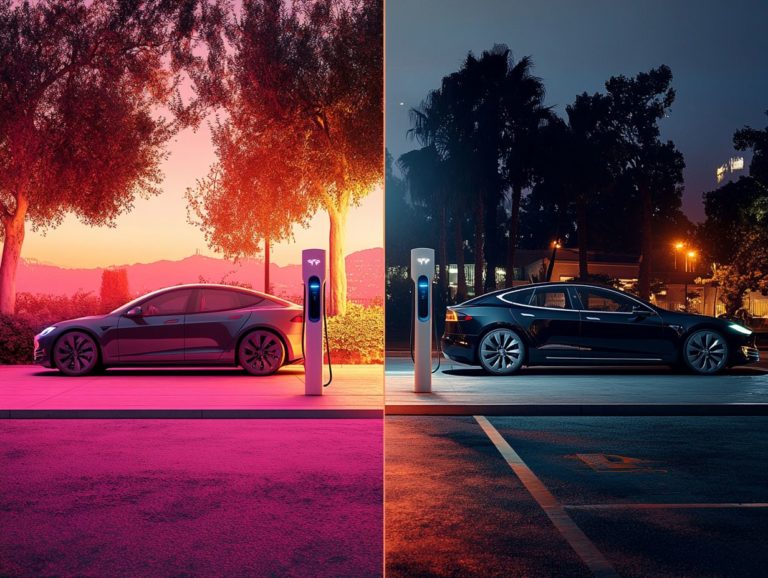how to choose the right ev charger for your home
As electric vehicles (EVs) gain traction in the automotive world, understanding how to select the perfect EV charger for your home becomes paramount.
With a plethora of charging options at your fingertips, it’s crucial to weigh factors such as charging speed, compatibility, installation requirements, and overall costs.
This guide dives into the various types of EV chargers Level 1, Level 2, and DC fast chargers while helping you evaluate your specific needs and offering insightful tips for installation and maintenance.
By the end, you ll be well-equipped to make an informed decision that aligns seamlessly with both your lifestyle and budget.
Contents
- Key Takeaways:
- Factors to Consider When Choosing an EV Charger
- Types of EV Chargers
- Choosing the Right EV Charger for Your Home
- Installation and Maintenance of EV Chargers
- Frequently Asked Questions
- What factors should I consider when choosing an EV charger for my home?
- How can I ensure my EV charger is installed safely?
- What are the differences between Level 1 and Level 2 chargers?
- How often should I perform maintenance on my EV charger?
- What is the difference between a Level 1 and a Level 2 EV charger?
- How do I know if my home’s electrical system can support an EV charger?
- Do I need to purchase an EV charger from the same manufacturer as my electric vehicle?
- What is the expected cost of installing an EV charger in my home?
- How can I ensure that my EV charger is installed safely and correctly?
Key Takeaways:
Think about your charging needs and budget when picking an EV charger. Assess your current situation and compare different brands and models to find the best fit for your home. For a comprehensive approach, consider how to plan your EV charging strategy. Proper installation and regular maintenance are crucial for optimal performance of your EV charger.
What is an EV Charger?
An EV charger, or electric vehicle charger, is an essential component that enables you to charge your electric vehicle (EV) by delivering electrical energy to power its battery. Chargers come in various types, including Level 1 and Level 2 chargers, each tailored to provide different charging speeds based on their specifications and compatibility with various EV models like Tesla, Chevrolet, and Nissan.
For optimal safety and efficiency, ensure that your EV charger has UL certification, which means it meets high safety standards.
Level 1 chargers typically utilize standard household outlets and offer a slower charging speed, giving you about 4-5 miles of range per hour. Conversely, Level 2 chargers require professional installation and often use a 240V outlet, delivering up to 25 miles of range per hour perfect for your home garage or commercial location.
If you’re in a rush, DC fast chargers are your best bet! They can recharge an EV’s battery to 80% in as little as 30 minutes.
When selecting an EV charger, think about the type of charging cable and its compatibility with your vehicle to ensure smooth integration and optimal performance.
Factors to Consider When Choosing an EV Charger
When picking the perfect EV charger for your vehicle, several important parts can greatly enhance your charging experience.
Consider aspects like charging speed, installation options, and compatibility with your specific EV model to ensure the charger aligns with your driving needs.
At home, you might choose between:
- Level 1 chargers: Easy access, budget-friendly, but slow.
- Level 2 chargers: Fast and efficient for home use.
- DC fast chargers: Quick but check for compatibility.
Choosing a smart charger can enhance your experience by optimizing charging sessions according to utility rates and your personal schedule.
Charging Speed and Compatibility
Charging speed is an important part of the electric vehicle (EV) charging landscape. It influences how quickly your EV can be recharged based on charger type and its compatibility with your specific model.
Level 1 chargers offer a slower charging speed, perfect for overnight use, while Level 2 chargers provide a more efficient and faster charging experience, making them ideal for home installations. If you re in a hurry, DC fast charging stations deliver the quickest charging times, but ensure compatibility with your vehicle for safe and effective operation.
Each charger type has its own set of advantages and disadvantages that can significantly impact your overall experience:
- Level 1 chargers are easy to access and budget-friendly, but their slow speed may be challenging if you have a hectic schedule.
- Level 2 chargers provide a balance between convenience and speed, making them a popular choice for both residential and public locations.
- DC fast chargers excel in speed but may not be compatible with every EV model, including major brands like Tesla, Audi, and Hyundai.
Understanding these aspects will not only aid you in selecting the right charger but also improve charging efficiency, leading to a smoother and more enjoyable driving experience.
Installation Options
Choosing the right installation option for your EV charger is essential to maximize both efficiency and safety. To ensure you select the best option for your situation, it’s helpful to understand how to identify the right EV for your needs. Carefully consider factors like your home’s wiring, electrical panel, and local regulations.
There are various installation choices available, such as:
- Wall-mounted units
- Portable charging stations
- Dual charging stations that can serve multiple vehicles at once
Choose wisely to ensure the appropriate standard rating for your charger, which guarantees compatibility with your electrical system and resilience against environmental factors, especially if you re leaning towards an outdoor solution.
Check your existing electrical infrastructure carefully. If you have an older system, it may require upgrades to handle the higher power demands of an EV charger. Professional installation is highly advisable.
Certified electricians will ensure that everything is set up to meet safety standards and local codes, greatly reducing any associated risks.
While installation costs can vary, many find it a worthwhile investment, especially when considering potential tax credits available for EV charger installations. Don t miss out! These incentives can cut your initial costs dramatically, making your transition to electric vehicles accessible and a smart financial move.
Cost and Budget
The cost of installing an EV charger can vary significantly based on a few key factors:
- Type of charging station
- Specifics of the installation
- Tax credits that might ease the financial load
For example, a Level 1 charger could set you back between $300 and $600. In contrast, a Level 2 charger might cost anywhere from $500 to over $1,500, depending on the brand and features you select. Installation costs can further add to these numbers, especially if you need electrical upgrades, which could push expenses up by another $1,000 or more.
Regarding energy costs linked to charging, these can add up, but you often benefit from lower electricity rates during off-peak hours, helping to balance the equation.
Plus, federal and state tax credits can sometimes cover up to 30% of the total installation cost, significantly reducing your out-of-pocket expenses and making that pricier Level 2 charger a more attractive investment over time.
Types of EV Chargers
Electric vehicle chargers come in a variety of types, tailored to suit distinct needs and preferences based on your charging requirements and vehicle compatibility.
Level 1 chargers, which utilize standard household outlets, are perfect for overnight charging, providing a convenient solution for daily needs.
On the other hand, Level 2 chargers significantly cut down charging time, making them a favored choice for home installations.
For those seeking rapid charging, DC fast chargers deliver the quickest charging available, though they may have some limitations regarding installation locations and compatibility with specific EV models.
Level 1 Chargers
Level 1 chargers are your entry point into the world of EV charging, using standard 120-volt outlets commonly found in most homes. They offer a convenient, albeit slower, charging solution for your electric vehicle.
If you charge overnight, they can work well for you. However, if you need faster charging speeds, you might find their energy output lacking, leading to longer charging times. That can be a hassle for frequent users. Nevertheless, they’re budget-friendly and easy to install, making them an excellent choice for casual EV owners.
These chargers typically provide about 4 to 5 miles of range per hour, ideal if your driving mainly consists of short commutes or local errands. Installation is relatively straightforward, often requiring minimal electrical work, so you may even set it up without calling in a professional.
While they accommodate various models, including compact cars and hybrids, families with multiple electric vehicles or those who often embark on long journeys might find Level 1 chargers insufficient.
They serve as a solid starting point for many, and being aware of their limitations can enhance your charging experience and enable you to make informed choices about your EV charging setup.
Embrace the future of driving make your EV charging setup a priority today!
Level 2 Chargers
Level 2 chargers enhance your EV charging experience by delivering faster power compared to Level 1 chargers. Utilizing 240-volt outlets, they’re well-suited for home installations or public charging stations.
Imagine charging your vehicle in just a few hours! This efficiency is why they’re a favorite among EV owners who prioritize convenience. With their higher charging capacity, you can create a flexible charging schedule that aligns seamlessly with your energy usage.
These chargers are compatible with many EV models! Factors influencing charging speed and efficiency include the charger’s power level, your vehicle’s battery size, and the capabilities of the onboard charger, which is the part that converts electricity for your vehicle.
As an added perk, many regions offer potential tax credits or incentives for installing Level 2 chargers. Act now to potentially save on installation costs! This makes them not just a practical option for personal use, but also a financially savvy investment for anyone considering the environmental benefits of electric vehicles.
DC Fast Chargers
DC fast chargers represent the best in electric vehicle charging technology, allowing you to dramatically reduce charging times. You can charge your EV to 80% in as little as 30 minutes, depending on your vehicle and the charging station specifications.
Unlike Level 1 and Level 2 chargers, DC fast chargers are typically found at specialized charging stations, making them ideal for long trips or quick stops during daily commutes. Ensure that your specific EV model is compatible because not all vehicles can handle the rapid charging speeds these chargers provide.
This technology works with direct current (DC), bypassing the onboard charger and sending power straight to your vehicle s battery. The benefits extend beyond speed; they enhance the efficiency of your long-distance travel. Models like the Tesla Model 3 and Ford Mustang Mach-E can gain substantial range in just a few minutes.
However, be mindful of certain limitations, such as higher infrastructure costs and the need for specialized equipment that may not be readily accessible everywhere. Additionally, prolonged use of fast charging could potentially accelerate battery wear, so consider this if you re aiming for longevity in your vehicle’s performance.
Choosing the Right EV Charger for Your Home
Choosing the perfect EV charger for your home involves a careful evaluation of your needs and circumstances. Before making a decision, be sure to understand what to know before buying an EV charger, including your driving habits, budget, and the compatibility of your electric vehicle.
Reflect on how frequently you’ll charge your EV and the charging speed you require. Understanding the cost of home EV charging can greatly shape your decision-making process regarding how much you’re prepared to invest in a home charger.
Also, consider your installation options and potential tax credits; these can significantly impact both your initial investment and long-term expenses.
Assessing Your Needs and Situation
Assessing your needs is key when selecting the right EV charger. Understanding your driving habits and daily routines can significantly influence what to look for in an EV charging plan that best suits you.
Consider factors like how far you typically drive each day, your charging schedule, and whether you share a charging station with others in your household. These aspects will play a crucial role in determining the most appropriate charging speed and type for you.
The distance you travel daily affects how often you need to recharge. This is vital for deciding between a Level 1 or Level 2 charger. If someone in your household frequently drives long distances, ensuring compatibility with their specific EV model becomes essential for optimal charging.
Additionally, your home infrastructure like available electrical capacity and access to a dedicated parking spot will also influence your choice of hardware.
By exploring these factors thoughtfully, you can create a seamless charging routine and enjoy the peace of mind that comes with knowing your electric vehicle is always ready to hit the road.
Comparing Different Brands and Models
When selecting an EV charger, compare different brands and models to find one that aligns with your needs regarding performance, safety standards, and compatibility with your electric vehicle.
Popular brands like FLO Home and Tesla offer a variety of chargers with diverse features. These features may include smart capabilities that enable you to optimize charging schedules and monitor usage through mobile apps. Consumer reports and reviews provide invaluable insights into the reliability and effectiveness of different charging options, guiding you toward a well-informed decision.
Consider the importance of a brand’s reputation. Established brands typically exhibit consistency in quality and customer service. For example, smart charging technology greatly enhances your experience by intelligently scheduling charging sessions and maximizing energy efficiency.
Exploring user reviews reveals the actual performance of these chargers and flags any potential installation requirements or challenges you might face. A comprehensive comparison of pricing and performance metrics enables you to assess the best value for your investment, ensuring you select a charger that meets your needs while fitting comfortably within your budget.
Installation and Maintenance of EV Chargers
Proper installation and ongoing maintenance of EV chargers are crucial for ensuring safety and efficiency, as well as compliance with electrical codes.
It’s essential that the installation is handled by a qualified professional who can evaluate your electrical system and devise an optimal setup tailored to your specific charging requirements.
Regular maintenance practices, such as inspecting connections and confirming that the charger is in excellent working condition, extend its lifespan and minimize potential risks linked to electrical faults.
Your commitment to these practices ensures a seamless and secure charging experience.
Proper Installation Process
The proper installation of an EV charger directly impacts its effectiveness and safety. Key considerations include assessing your existing electrical panel, ensuring compliance with safety standards, and selecting the optimal location.
A qualified electrician should evaluate your home s electrical system to confirm it can handle the increased load from the charger. Following that, the correct installation of the charger unit is crucial. This may include routing charging cables and ensuring weather-proofing if you choose outdoor installation.
Taking these measures seriously enhances the overall performance of the charger and protects against potential hazards. Neglecting to adhere to local electrical codes could lead to legal issues or unsafe conditions like electrical fires.
Your options may vary based on your needs and the type of vehicle you own. Level 1 chargers are basic models that plug into standard outlets, while Level 2 chargers require a dedicated circuit and offer faster charging capabilities.
Understanding these differences enables you to choose an installation plan that perfectly aligns with your driving habits and schedule.
Maintenance Tips for Optimal Performance
Regular maintenance is a must for peak performance and longevity of your EV charger, ensuring adherence to crucial safety standards that help prevent potential hazards.
By routinely engaging in these necessary tasks, you significantly influence your charger s efficiency, minimizing the risk of malfunctions and extending its lifespan.
Regular upkeep aids in identifying any electrical issues early and plays a vital role in upholding safe operation standards.
One specific task to prioritize is checking the ground fault circuit interrupter (GFCI) functionality, which protects against electrical shocks.
Make sure the charger is installed in a clean area to enhance its performance. Dirt and moisture can compromise effectiveness and lead to costly repairs in the future.
Frequently Asked Questions
What factors should I consider when choosing an EV charger for my home?
When choosing an EV charger for your home, consider the charging speed, compatibility with your vehicle, installation requirements, cost, and how to install a home EV charging station.
How can I ensure my EV charger is installed safely?
Hire a qualified professional to evaluate your electrical system and handle the installation to ensure it meets safety standards.
What are the differences between Level 1 and Level 2 chargers?
Level 1 chargers are basic models that plug into standard outlets, while Level 2 chargers require a dedicated circuit and offer faster charging capabilities.
How often should I perform maintenance on my EV charger?
Regular maintenance is recommended to ensure optimal performance, ideally at least once every few months.
What is the difference between a Level 1 and a Level 2 EV charger?
Level 1 chargers use standard household outlets. They provide about 4-5 miles of range per hour.
In contrast, Level 2 chargers require a special 240-volt outlet. They can charge your vehicle at a rate of 25-30 miles of range per hour.
How do I know if my home’s electrical system can support an EV charger?
It’s crucial to consult an electrician. They can check if your home can handle the extra power needed for an EV charger.
Also, make sure you have a dedicated circuit available for the charger.
Do I need to purchase an EV charger from the same manufacturer as my electric vehicle?
No, you can choose any compatible EV charger. Most chargers work with all electric vehicles, but always confirm compatibility before buying.
What is the expected cost of installing an EV charger in my home?
Installation costs can vary based on the charger type and your home’s electrical setup.
On average, you can expect to spend between $500 and $2500.
How can I ensure that my EV charger is installed safely and correctly?
For safe installation, hire a licensed electrician who specializes in EV chargers.
They know the best practices and requirements to get the job done right.





